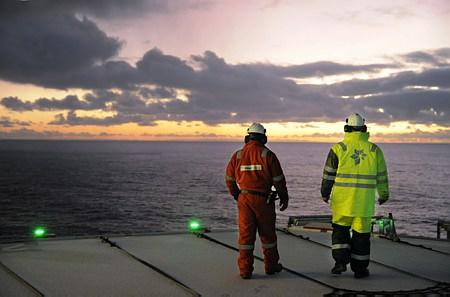Norwegian oil company Statoil is banking on opportunity but faces high risk in its new pact with Russian state oil company Rosneft for oil and gas exploration in the Barents Sea. Reaction to the historic agreement is generally positive in Norway, but some red flags are flying.

The agreement struck over the weekend between Statoil and Rosneft is being hailed as a breakthrough in the Barents for those who believe the area holds the world’s next huge sources of as-yet untapped oil. The pact basically allows each oil company to search for new sources of oil and gas in each other’s sectors of the Barents, in areas covering 100,000 square kilometers. The sectors themselves officially took effect just last year, after the Norwegian and Russian governments had suddenly agreed on their border in the Barents after decades of negotiations.
Oil industry analysts started rubbing their hands as soon as the so-called delelinjen (dividing ine) marking Norwegian and Russian territory in the Barents was formally approved. Some believe Norway alone can find more oil and gas resources in the Arctic area than it’s enjoyed during the past 40 years of oil activity in the North Sea.
Now Statoil can also cross the line into Russian territory as well, in cooperation with its Russian counterpart, and vice versa. Both are optimistic about the potential for striking more oil and gas deposits, despite the famously harsh exploration conditions in the far Arctic north.
Political challenges
That’s where much of the risk lies as well, along with Statoil’s sheer political challenges of working with a company owned by a country not known for holding the same democratic system and strict regulations of Norway or other oil-producing countries in the west. Newspaper Dagens Næringsliv (DN) noted how British Petroleum (BP) has run into enormous difficulties in Russia, as have other companies like Shell of The Netherlands and, in another business, Norway’s own Telenor.
“The framework can be changed, like the Russians have done earlier,” independent oil analyst Henrik Ramm told DN. He called the new agreement between Statoil and Rosneft, signed in the presence of Russia’s newly elected president Vladimir Putin on Saturday, “brilliant,” but cautioned that Russia’s track record creates unpredictability.
“It’s also risky to be the smaller part in a cooperation with a large international company,” Ramm told DN. “Rosneft has the power, but Statoil will do the job. Therein lies a source of conflict.”
For Statoil’s presentation of its deal with Rosneft, click here (external link).
Others note that exploration areas included in the deal are extremely far from land, and that Arctic conditions will test the offshore abilities of Statoil despite its years of experience in the harsh North Sea and Norwegian Sea. There also are huge environmental risks, with exploration in the Barents an issue of great controversy in Norway, where government officials voice concern for the climate and defend their oil industry at the same time.
Professor Petter Osmundsen at the University of Stavanger noted that Statoil will have a high risk of exposure as it invests hundreds of billions in exploration and potential extraction projects with the Russians. Statoil will have a strong negotiating position, though, given its recent string of oil and gas discoveries off Norway. It’s Statoil’s offshore experience that Rosneft lacks.
“If they find big reserves (in the Barents) then they really will have laid the golden egg,” Jan Magne Markussen of private research firm Ocean Futures told DN. He thinks the biggest prospects for oil and gas in the Barents lie on the Russian side, to which Norway will now have access.
‘Important milestone’
Norwegian politicians including Prime Minister Jens Stoltenberg were jubilant, though, as were Norwegian labour leaders who now see prospects for even more jobs and industrial creation in Norway. Statoil’s chief executive, who said he and his colleagues had been working around the clock on the deal for the past several weeks, claimed he was well aware of the risks involved but thinks they’re offset by the potential for rewards.
“We have to make an evaluation of risk in all agreements, also this one, with regard to political risk, economic risk and technological risk,” Lund said. He claimed, however, that the nature of the agreement poses incentives for both sides to cooperate.
Lund called the agreement a “breakthrough” and “an important milestone,” tailored for Statoil’s exploration strategy. He realizes the access it gives to umoden areas (the opposite of mature oil fields) also implies high risk, but the rewards can thus be higher as well.
The first phase will involve investment in seismic operations and the drilling of 24 exploration wells. Lund insisted that won’t come at the expense of other projects. He seemed convinced the new deal with Rosneft will be far more successful that Statoil’s stalled deal with Gazprom of Russia on the Stockman project. Its expensive investment has literally been put on ice, not least because of major changes in what the market would be for Stockman’s gas.
The new deal in the Barents “is a great strategic step for Statoil and Rosneft,” Lund told newspaper Aftenposten. Putin was pleased, too, as he watched Lund sign the deal in Moscow on Saturday with Rosneft chief executive Eduard Khudainatov: “I am convinced this will be a success.”
Views and News from Norway/Nina Berglund
Please support our stories by clicking on the “Donate” button now:

